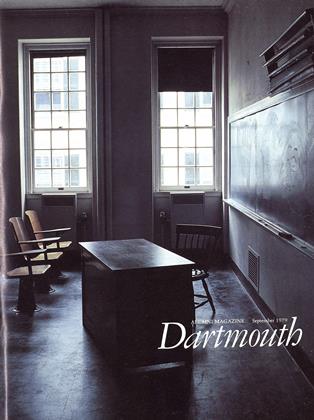Evan Connell begins A Long Desire by recalling the death of that romantic traveller, Richard Halliburton, who disappeared in 1939 while crossing the Pacific in a Chinese junk. For Connell, Halliburton was "the last great traveller," a man impelled by "that sensual urge which Anatole France called 'un long dèsir.' "
Given such a beginning, a reader might expect Connell's book to be simply another effusion on the romance of travel and exploration, but it is not. For Connell does not restrict the meaning of the phrase "a long desire" to travel through space. True, the first chapter deals entirely with travellers and explorers — not only with Halliburton, but also with Pytheas, Hsuan-Tsang, and such doughty Victorian ladies as Isabella Bird Bishop and Mary Kingsley. But the second chapter is essentially an essay on Connell's own love of the past and the beautiful objects that can evoke it; the third chapter traces the endless search for the lost city of Atlantis; the fourth tells the story of the children's crusades; the fifth discusses the many manifestations of Prester John; and so on through a final chapter on Paracelsus. Connell's epigraph, a quotation from D. H. Lawrence, suggests how loosely he construes "a long desire": "The soul has many motions,/ many gods come and go."
The reader soon discovers that for Connell travel in time is as important as travel in space. His book deals with many exotic places and with man's restless, everlasting movements around the globe, but it also is an adventure in time, as Connell himself tries to evoke the past, often the deep past. His evocations are not overtly romantic in mood; with his frequently wry tone, in fact, he partly modernizes the past by making skeptical 20th-century comments on the dreams and obsessions that are his main subject. Discussing the origin of Atlantis in Plato's dialogues, for example, he writes: "The capital, he said, was a circular city such as we might expect — temples, parks, docks, bridges, racetracks, various public facilities, et cetera — enriched with gold, silver, ivory, and presumably whatever else the heart desires. Atlanteans lived the good life for a long time, but at last they succumbed to moral rot and the bottom dropped out. More specifically, although Kritias ends in midsentence, it appears that Zeus just got fed up with everybody and pulled the plug. Why Plato drowned his children instead of frying them forever in Hell is not known, except possibly to psychoanalysts, but it hardly matters."
Such breezy remarks do not entirely undercut the romance inherent in Connell's material, nor does he intend them to. In fact, the success of his book comes partly from the way that he keeps a balance between romance and skepticism. He may laugh at the greed of the Conquistadores in search of El Dorado or at the arrogance of the alchemist Paracelsus, but he admires their energy — their display of sheer force in pursuit of false grails. They survive the laughter, and they emerge from the obscure past somehow larger and more impressive than modern man.
Connell covers a remarkable range in his book. There are 11 chapters, and within each chapter he moves rapidly from subject to subject in what appears to be almost a free association of ideas. As anyone who has read Connell's fiction knoows, he is a master of the short, significant incident. He uses this skill to advantage in A Long Desire: It allows him to create panorama without losing the specificity that makes his book delightful. His quotations are telling, and one in particular typifies the zany magnificence of his subjects. The Conquistador Orellana, recalling how he and his men were lost and starving in the Amazon Basin, wrote of their departure from one hard camp: " 'After boiling our boots in herbs, we set off for the kingdom of gold.' "
A LONG DESIREby Evan S. Connell '45Holt, Rinehart and Winston, 1979. 275 pp.$10.95
Professor Loomis teaches 18th and 19th century English literature at the College. He is theauthor of Weird and Tragic Shores, about Arctic explorer Charles Francis Hall, and hashimself been a member of expeditions to theArctic, Africa, and South America.
 View Full Issue
View Full Issue
More From This Issue
-
 Feature
FeatureUps and Downs in the Big Leagues
September 1979 By Keith Bellows -
 Feature
FeatureTemples, Turtles and Fat Boys
September 1979 By Dan Nelson -
 Feature
FeatureThe Kids Danced
September 1979 By Robert Feakins -
 Article
ArticleThe Bard's American Friend
September 1979 By Michael Colacchio '80 -
 Class Notes
Class Notes1954
September 1979 By JOHN L. GILLESPIE, Fred Alpert '54 -
 Class Notes
Class Notes1974
September 1979 By WILLIAM B. CATER JR.
Chauncey C. Loomis Jr.
Books
-
 Books
BooksAlumni Articles
MAY 1970 -
 Books
BooksLake Unlocked
SEPT. 1977 By CHARLES T. MORRISSEY '56 -
 Books
BooksFarmers and Workers in American Politics
March 1925 By Erville B. Woods -
 Books
BooksLAW AND VIETNAM.
FEBRUARY 1969 By HOWARD BLISS -
 Books
BooksLATIN-FOURTH YEAR.
June 1931 By Lawrence Leighton -
 Books
BooksRENAL FUNCTION: MECHANISMS PRESERVING FLUID AND SOLUTE BALANCE IN HEALTH.
December 1973 By ROY P. FORSTER



